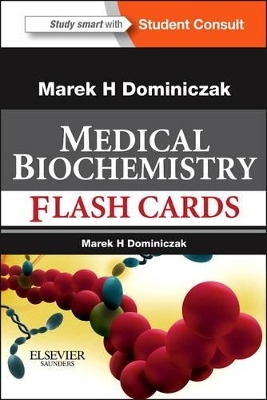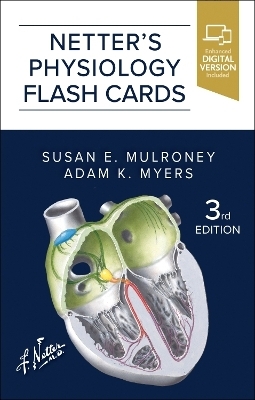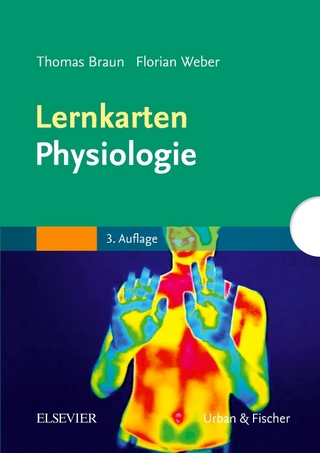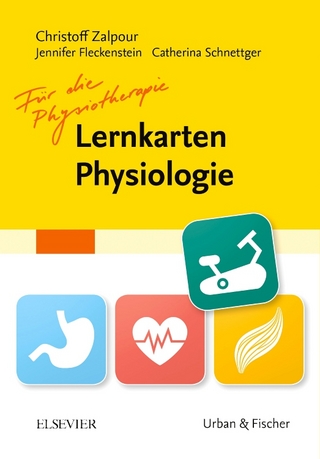
Medical Biochemistry Flash Cards
Saunders
978-0-323-08193-1 (ISBN)
- Titel ist leider vergriffen;
keine Neuauflage - Artikel merken
Get more out of your biochemistry review with Baynes and Dominiczak's "Medical Biochemistry Flash Cards"! 224 clinically focused, full-color cards not only prepare you for exams, but also help you apply what you've learned to your future medical practice. Quick and easy to use, these portable and versatile flash cards are extremely effective for learning and retaining challenging biochemistry content.
Metabolism 1 Overview AA and proteins 2 Types of amino acids neutral, basic acidic 3 HH and ionization pK; HH and buffers 4 Protein structure- primary to quarternary 5 Techniques of protein separation Carbohydrates and lipids 6 Classification of carbohydrates 7 Fatty acids 8 Lipids Plasma 9 Blood- components. Complete blood count. 10 Plasma proteins 11 Immunoglobulins 12 The transport function of plasma Oxygen 13 Heme, myoglobin and haemoglobin Oxygen- pressures 14 Allosterism, Bohr effect 2,3-DPG Enzymes 15 Energy and Classification 16 Enzymes and disease 17 Enzyme kinetics. Enzyme inhibiton 18 Enzyme regulation Hemostasis 19 Overview. Causes of excessive bleeding Platelets 20 Coagulation 21 Fibrinolysis Membranes 22 Structure 23 Modes of transport 24 Primary active transporters Glucose transporters 25 Calcium transport and muscle contraction 26 Acid secretion in the stomach Bioenergetics 27 The process of oxidation of fuels Reduced coenzymes and ATP 28 Oxidative phosphorylation 29 ATP synthase 30 Electron shuttles 31 Inhibitors and uncouplers GI tract 32 GI tract and digestion 33 Digestion of carbohydrates 34 Digestion of lipids 35 Digestion of proteins Micronutrients 36 Fat soluble vitamins 37 Water soluble vitamins 38 Vit B12 39 Trace elements Glycolysis 40 Glycolysis- investment stage 41 Glycolysis- yield stage 42 Glycolysis and other pathways 43 Pentose phosphate pathway- the redox stage. Pentose phosphate pathway-- interconversion stage Glycogen 44 Nutrients and pathways 45 Glycogen structure & synthesis 46 Glycogen degradation glycogenolysis 47 The action of glucagon 48 Glycogen storage diseases 49 Gluconeogenesis 50 Regulation of gluconeogenesis TCA cycle 51 Acetyl-CoA 52 Amphibolic nature of the cycle 53 Pyruvate 54 Pyruvate dehydrogenase (PDH) 55 TCA and its enzymes 56 Regulation of PDH 57 Energetics 58 TCA cycle regulation and anaplerotic reactions Lipid oxidation 59 Fatty acid activation and transport 60 Beta-oxidation 61 Ketogenesis 62 Regulation of lipid metabolism by glucagon and epinephrine Biosynthesis of fatty acids 63 The Ac-CoA carboxylase 64 Fatty acid synthetase -structure 65 Fatty acid synthetase reaction 66 Malate shuttle - transport of 2C units from the mitochondria 67 Elongation and desaturation 68 Triglycerides and essential fatty acids Cholesterol 69 Cholesterol synthesis and related pathways 70 Biosynthesis of mevalonic acid 71 Biosynthesis of farnesyl-P, squalene 72 Biosynthesis of cholesterol 73 Regulation of cellular cholesterol concentration 74 Bile acids: structure and metabolism 75 Biosynthesis of steroid hormones 76 Classes of steroids Lipoproteins 77 Lipoprotein particle and its components 78 Apoproteins and their receptors 79 Fuel transport and overflow pathway 80 Reverse cholesterol transport 81 Dyslipidemias 82 Atherogenesis Biosynthesis and degradation of amino acids 83 Amino acids and related substances 84 Urea cycle- sources of urea atoms 85 Transamination and oxidative deamination 86 Amino acids and central metabolic pathways 87 Branched chain amino acids 88 Aromatic amino acids 89 Essential and nonessential AA Muscle 90 Muscle proteins and sarcomere 91 Muscle contraction 92 Biochemistry of muscular exercise. Creatine phosphate 93 Troponin and myocardial infarction Glucose and fuel metabolism 94 Anabolism and catabolism 95 Glucose homeostasis 96 Insulin action 97 Glucagon-insulin antagonism 98 The role of enzyme phosphorylation 99 Hypoglycemia 100 Fed state 101 Fasting state 102 Starvation 103 Metabolism during stress and injury 104 Definition and classification of diabetes 105 Metabolism in diabetes 106 Diabetic ketoacidosis and long term complications 107 Diabetes: diagnostic criteria and laboratory diagnosis Nutrition and energy balance 108 Regulation of food intake 109 Caloric content and nutritional requlation Classes of nutrients 110 Iron metabolism 111 Malnutrition 112 Obesity Water and electrolytes 113 Body compartments Electrolyte content of fluids 114 Water balance Osmolality 115 Assessment of renal function 116 Potassium 117 Renin-angiotensin system Links between water and sodium metabolism 118 Vasopressin and aquaporins Acid base 119 Acid base balance 120 Acid-base disorders 121 The gas exchange Transport of carbon dioxide 122 Excretion of bicarbonate Calcium and bone 123 Bone resorption and bone formation Disorders of calcium metabolism 124 Calcium homeostasis 125 Vitamin D Complex glycoproteins 126 Glycoproteins 127 Glucose mannose and galactose 128 Metabolism of fructose 129 Sialic acid. Role of complex carbohydrates Complex lipids 130 Phospholipids 131 Sphingolipids 132 Cerebrosides and gangliosides Extracellular matrix 133 Collagens Other proteins of the extracellular matrix Liver 134 Functions of the liver 135 Heme synthesis 136 Bilirubun metabolism 137 Drug metabolism Alcohol 138 Jaundice Nucleotides 139 Purine synthesis 140 Conversion of nucleotides 141 Purine salvage pathways 142 Degradation of purines 143 Pyrimidine synth 144 Synthesis of nucleotides DNA 145 Structure Types of DNA 146 Replication 147 Mutations and repair RNA 148 Classes of RNA 149 Transcription 150 RNA processing Protein synthesis 151 Genetic code 152 Activation of amino acids and interaction with tRNA 153 Initiation 154 Peptide bond formation 155 Termination 156 Ribosomes and endoplasmic reticulum 157 Proteasome and ubiquitin Gene expression 158 Control of gene expression 159 Components of the control system 160 Steroid receptors 161 Other regulatory mechanisms Recombinant DNA technology 162 Molecular hybridization 163 Microarrays 164 Restriction enzymes 165 Southern blotting 166 DNA cloning- PCR 167 Analysis of DNA 168 DNA sequencing Genomics and proteomics 169 Genomics-techniques 170 Proteomics 171 Metabolomics and biomarkers Oxygen and life 172 Reactive oxygen species (ROS) and oxidative stress 173 Formation of ROS Lipid peroxidation 174 Antioxidants Immune response 175 Innate immune response 176 Adaptive immune response 177 Elimination of antigens 178 Humoral response 179 Autoimmunity hypersensitivity immunodeficiency Endocrinology 180 Hormones and Hormone-binding proteins 181 Hormone measurements and function tests 182 Endocrine axes and disorders 183 Thyroid hormones 184 Endocrinology of the adrenal cortex - cortisol 185 Endocrinology of the adrenal cortex - androgens and estrogens 186 Gonadal hormones and the menstrual cycle 187 The growth hormone and prolactin Receptors and Signal Transduction 188 Hormone receptors 189 G-protein signaling 190 C-AMP 191 Protein kinase A system 192 Phosphoinositol and DAG and PKC 193 Arachidonic acid, phospholipases and eicosanoids Neurochemistry 194 Neurones 195 Mechanism of vision Neurotransmitters 196 Nature of neurotransmitters 197 Ionotropic and metabotropic receptors 198 Synthesis of neurotransmitters 199 Catabolism of catecholamines 200 Nitric oxide Growth, differentiation and cancer 201 Cell cycle 202 Growth factors and their receptors 203 Apoptosis 204 Cancer, oncogenes and tumour suppressor genes Aging 205 Theories of aging 206 Biochemistry of aging
| Erscheint lt. Verlag | 7.9.2012 |
|---|---|
| Zusatzinfo | Approx. 225 illustrations (200 in full color) |
| Verlagsort | Philadelphia |
| Sprache | englisch |
| Maße | 102 x 152 mm |
| Themenwelt | Studium ► 1. Studienabschnitt (Vorklinik) ► Physiologie |
| ISBN-10 | 0-323-08193-2 / 0323081932 |
| ISBN-13 | 978-0-323-08193-1 / 9780323081931 |
| Zustand | Neuware |
| Haben Sie eine Frage zum Produkt? |
aus dem Bereich


